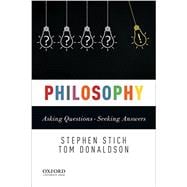
Philosophy Asking Questions--Seeking Answers
by Stich, Stephen; Donaldson, Tom-

This Item Qualifies for Free Shipping!*
*Excludes marketplace orders.
Buy Used
Rent Textbook
Rent Digital
New Textbook
We're Sorry
Sold Out
How Marketplace Works:
- This item is offered by an independent seller and not shipped from our warehouse
- Item details like edition and cover design may differ from our description; see seller's comments before ordering.
- Sellers much confirm and ship within two business days; otherwise, the order will be cancelled and refunded.
- Marketplace purchases cannot be returned to eCampus.com. Contact the seller directly for inquiries; if no response within two days, contact customer service.
- Additional shipping costs apply to Marketplace purchases. Review shipping costs at checkout.
Summary
Author Biography
Stephen Stich is Board of Governors Professor of Philosophy at Rutgers University and an Honorary Professor at the University of Sheffield. Known for his contributions to the philosophy of mind, he is the author of Mindreading (OUP, 2003) and Deconstructing the Mind (OUP, 1996) and many other books.
Tom Donaldson is Assistant Professor in the Philosophy Department at Simon Fraser University. While receiving his MMathPhil (1st class) in Mathematics and Philosophy at Oxford University, he was awarded the Henry Wilde Prize, the Elizabeth Anscombe Prize, and the Gibbs Prize.
Table of Contents
Chapters 3-15 end with a Glossary, Comprehension Questions, Discussion Questions, What to Look at Next, and Notes.
Chapter 1. What Is Philosophy?
1. Philosophy Is Everywhere
2. What Is a Philosophical Question?
3. The Philosophical Method
4. Philosophy and Science
5. Why Bother?
Notes
Discussion Question
Chapter 2. What Are Arguments, and How Should We Evaluate Them?
1. Introduction
2. Premises and Conclusions
3. Evaluating Arguments
4. Deductive Validity
5. Induction and Abduction
6. Multistep Arguments
7. Evaluating Multistep Arguments
8. Some Arguments to Evaluate
9. Answers to Problems
What to Look at Next
Glossary
Notes
Chapter 3. Does God Exist?
1. Introduction
2. The First Cause Argument
3. Some Questions about the First Cause Argument
4. Leibniz's Cosmological Argument
5. The Design Argument
6. Criticisms of the Design Argument
7. Anselm's Ontological Argument
8. What, If Anything, Is Wrong with Anselm's Ontological Argument?
9. A Pragmatic Case for Theism?
10. Conclusion
Chapter 4. Why Does God Leave Us to Suffer?
1. Introduction
2. Three Logical Puzzles for Theists
3. Introducing the Problem of Evil
4. Three Inadequate Responses
5. Rethinking the Nature of God
6. Theodicy
7. Skeptical Theism
8. Conclusion
Chapter 5. Can We Be Completely Certain of Anything?
1. Introduction
2. Descartes's Project
3. Certainty Is Hard to Find
4. Achieving Certainty
5. Vivid and Clear Perception
6. Descartes's Theism, and His Solution to the Evil Demon Problem
7. The Cartesian Circle
8. Descartes's Legacy
9. Conclusion
Chapter 6. Can We Trust Our Senses?
1. Rationalism and Empiricism
2. Indirect Realism
3. Primary and Secondary Qualities
4. Do Material Objects Really Exist?
5. Berkeley's Idealism
6. Direct Realism
7. Conclusion
Chapter 7. Will the Sun Rise Tomorrow?
1. Introduction
2. Making Predictions
3. Hume's Problem
4. The Principle of Uniformity of Nature
5. Karl Popper
6. Peter Strawson
7. Epistemically Basic Beliefs
8. Beyond Enumerative Induction
Chapter 8. What Is Knowledge?
1. Introduction
2. Three Kinds of Knowledge
3. Analyzing Propositional Knowledge: The Easy Part--Belief and Truth
4. Analyzing Propositional Knowledge: The Hard Part--Justification
5. Foundationalism
6. Coherentism
7. Internalism and Externalism
8. Fallibilism and Skepticism
9. Gettier Cases--A Challenge to the Justified True Belief Account of Knowledge
Chapter 9. Do We Have Free Will?
1. What Is Determinism?
2. Hard Determinism
3. Soft Determinism
4. Libertarianism
Chapter 10. How Is Your Mind Related to Your Body?
1. Introduction
2. Cartesian Dualism
3. Philosophical Behaviorism
4. The Mind-Brain Identity Theory
5. Functionalism
6. Back to Dualism?
Chapter 11. Will You Be the Same Person in Ten Years? Could You Survive Death?
1. The Philosophical Issue and Its Practical Importance
2. The Soul Theory
3. Problems for Soul Theory
4. Memory Theories
5. Personal Identity and the Brain
Chapter 12. Are There Objective Truths about Right and Wrong?
1. Introduction
2. Objective Truth
3. The Divine Command Theory
4. Cultural Relativism
5. Subjectivism and Expressivism
6. The Qualified Attitude Theory
7. Conclusion
Chapter 13. What Really Matters?
1. Introduction
2. Hedonism
3. Sartre
4. Susan Wolf on Meaningfulness
5. Conclusion
Chapter 14. What Should We Do? (Part I)
1. Act Consequentialism and Act Utilitarianism
2. Objections to Act Utilitarianism
3. Rule Consequentialism and Rule Utilitarianism
4. Kant's Universalization Test
5. Kant's Humanity Formula
6. Comparing Kantianism and Consequentialism
Chapter 15. What Should We Do? (Part II)
1. Introduction
2. Is It Morally Wrong to Go to the Opera While People Are Starving?
3. Vegetarianism
4. Is Abortion Morally Wrong?
Appendix A. Reading and Writing Tips
Seven Tips on Reading Philosophy
Eighteen Tips for Writing Philosophy Papers
Appendix B. The Truth about Philosophy Majors
Careers
Salaries
Meaning
Resources
Glossary
Credits
Index
An electronic version of this book is available through VitalSource.
This book is viewable on PC, Mac, iPhone, iPad, iPod Touch, and most smartphones.
By purchasing, you will be able to view this book online, as well as download it, for the chosen number of days.
Digital License
You are licensing a digital product for a set duration. Durations are set forth in the product description, with "Lifetime" typically meaning five (5) years of online access and permanent download to a supported device. All licenses are non-transferable.
More details can be found here.
A downloadable version of this book is available through the eCampus Reader or compatible Adobe readers.
Applications are available on iOS, Android, PC, Mac, and Windows Mobile platforms.
Please view the compatibility matrix prior to purchase.
